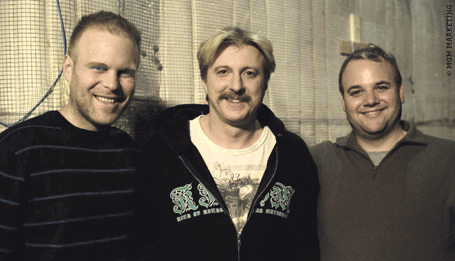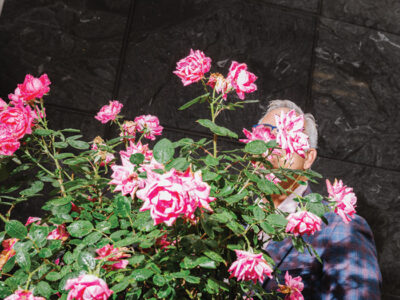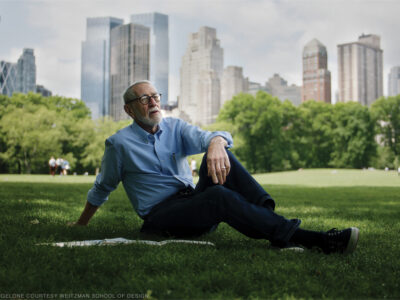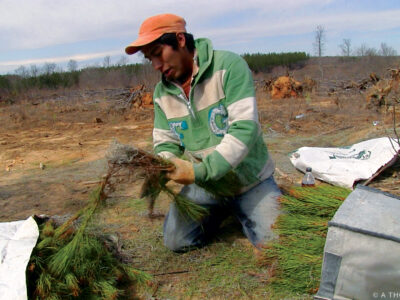
Class of ’00 | When Josh Heald W’00 decided to write R-rated comedies for a living, he knew that he was likely to have his full share of bizarre moments along the way. He just never expected his offbeat dreams would take flight after writing Hot Tub Time Machine, a movie that stemmed from a misheard conversation, a title that made him laugh, and a concept so ridiculous even he has a hard time believing it ever found its way onto the big screen.
“I’m still trying to wrap my brain around the fact that this is not just a thing on my computer,” says Heald, “but something that’s being seen by the world.”
The fact that Hot Tub Time Machine featured such well-known actors as John Cusack and Chevy Chase, grossed around $50 million after being released in late March, and received mostly favorable reviews is remarkable not only because of the film’s title … but also because it was the film’s title that came before anything else.
A couple of years ago, a producer named Matt Moore suggested that Heald remake Hot Dog, a 1980s teen comedy that takes place at a ski resort. Heald heard the words as Hot Tub, which excited him because he didn’t know there was a movie by that name—which of course there isn’t. But that got him thinking. How could he write a script that revolves around a hot tub and also brings back all of the nostalgic elements of a 1980s comedy?
There would have to be some kind of … Hot Tub Time Machine!
“When he first said the title, I remember thinking it was genius,” says fellow screenwriter and Penn classmate Jon Hurwitz W’00, who also co-wrote a highly successful film with a ridiculous title: Harold and Kumar Go to White Castle [“Arts,” Nov|Dec 2004]. “People love hot tubs and people love time machines. It’s as simple as that.”
Others weren’t quite as sold on the idea. Some friends brushed it off as another one of his pranks, like the time he left phone messages impersonating CEOs and headhunters for longtime roommate Harold Lee C’00 W’00 (the inspiration for Harold and Kumar).
“A lot of friends rolled their eyes at me and were convinced it was a dumb waste of my time,” says Heald. “It’s been nice to return to them and say, ‘Remember that waste of time? I just sold it.’ And they’d say, ‘Yeah, well good luck getting it made.’ And I’d come back with, ‘It got made. And John Cusack is in it.’ It’s nice to know I’m not crazy.”
Well, the jury’s still out on that one. How else can you explain him leaving a cushy consulting job in San Francisco so he could use his Wharton degree to read scripts for a living while absorbing a ton of credit-card debt? Or why he continued to write movie after movie when the chance of any getting made often seemed about as realistic as, well, a hot tub transporting people through time?
“I tell writers all the time not to become attached,” Heald says. “As soon as you finish a screenplay, you should pretend to throw it in a fire. Assume nothing good will happen.”
Yet Hot Tub seemed charmed from the start. After writing the film’s crude but hilarious screenplay while on set in New Orleans for the movie Mardi Gras (the only other one of Heald’s scripts that’s been made, though it still hasn’t been released), Heald pitched Hot Tub to studios in May 2008.
“Josh is definitely one of the best pitchmen in Hollywood,” Hurwitz says. “He’s really funny and entertaining.”
MGM bought the screenplay, fast-tracked it into production, and promoted it in a very tongue-in-cheek way. Much like Snakes on a Plane a few years earlier, Hot Tub gained steam on the Internet because of its attention-grabbing title.
About a year after the script was bought, it was shot in a deserted British Columbia ski resort and around Vancouver. Once it was released, a number of critics gave the impression of enjoying it a lot more than they thought they would.
Along the way, Heald enjoyed what he called many “bucket-list moments.” Among them were the nights when Hot Tub star Craig Robinson (The Office) improvised songs detailing exactly what people were doing while on location. (Sadly, “Josh is eating a sandwich” is not yet available on iTunes.) And then there was the added bonus of getting the chance to work with Billy Zabka (the bully in Heald’s all-time favorite movie, The Karate Kid) and Crispin Glover (George McFly in the original Back to The Future), both of whom revived their status as ’80s icons with supporting roles in Hot Tub.
One night Glover shared stories in front of a captivated audience—which Heald calls his “hanging out with the Rat Pack moment.”
“Wow, I’m listening to Crispin tell us about Back to the Future while making the strangest time-travel movie of all time,” Heald remembers thinking.
The best part for Heald, now that Hot Tub has been released in theaters and on DVD, is the notion that his film may soon be watched by college kids across the country. After all, he knows how important his own college experience was in shaping his comedic voice. From constantly joking with Hurwitz and Lee at their filthy Baltimore Avenue house that was “one match away from burning to the ground,” to editing 34th Street, to religiously quoting the most random lines from Kingpin and The Big Lebowski, Heald’s time at Penn was less about the classes he took than the laughs he shared. “I’m one of the nerds who quotes other peoples’ movies,” he says. “Having people throw my quotes back at me is awesome. It’s incredible.”u
—Dave Zeitlin C’03




